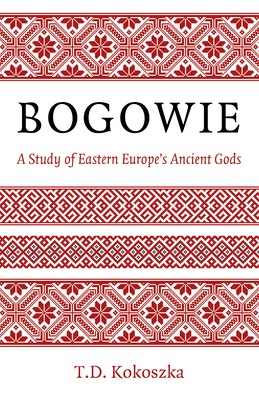
- We will send in 10–14 business days.
- Author: Troy David Kokoszka
- Publisher: Moon Books
- ISBN-10: 1803412852
- ISBN-13: 9781803412856
- Format: 13.8 x 21.4 x 2.6 cm, minkšti viršeliai
- Language: English
- SAVE -10% with code: EXTRA
Bogowie: A Study of Eastern Europe's Ancient Gods (e-book) (used book) | bookbook.eu
Reviews
Description
T.D. Kokoszka grew up in Texas with a Jewish mother and a Polish-American father. While he was aware of roots going back to Eastern Europe from both families, he found it hard to learn very much about them. He knew that Polish people would whack one another with palm leaves around Easter, and he knew that his great-grandmother purportedly believed in forest spirits known as borowy. However, it wasn't until he was in his teens that he became vaguely aware of an ancient people known as the Slavs who gave rise to the Polish, Ukrainian, Russian, Serbian, Bulgarian, Slovakian, Slovene, and Czech languages. It quickly became clear to him that this was a family of cultures currently under-represented in popular culture, and even in western scholarship. Not simply a regurgitation of scholarship from the Soviet period - and presenting new analyses by using previously neglected resources - Bogowie: A Study of Eastern Europe's Ancient Gods offers one of the most painstaking scholarly reconstructions of Slavic paganism. These new resources include not only an overview of folklore from many different Slavic countries but also comparisons with Ossetian culture and Mordvin culture, as well as a series of Slavic folktales that Kokoszka analyzes in depth, often making the case that the narratives involved are mythological and shockingly ancient. Readers will recognize many European folktale types and possibly learn to look at these folktales differently after reading this book.
EXTRA 10 % discount with code: EXTRA
The promotion ends in 22d.14:02:20
The discount code is valid when purchasing from 10 €. Discounts do not stack.
- Author: Troy David Kokoszka
- Publisher: Moon Books
- ISBN-10: 1803412852
- ISBN-13: 9781803412856
- Format: 13.8 x 21.4 x 2.6 cm, minkšti viršeliai
- Language: English English
T.D. Kokoszka grew up in Texas with a Jewish mother and a Polish-American father. While he was aware of roots going back to Eastern Europe from both families, he found it hard to learn very much about them. He knew that Polish people would whack one another with palm leaves around Easter, and he knew that his great-grandmother purportedly believed in forest spirits known as borowy. However, it wasn't until he was in his teens that he became vaguely aware of an ancient people known as the Slavs who gave rise to the Polish, Ukrainian, Russian, Serbian, Bulgarian, Slovakian, Slovene, and Czech languages. It quickly became clear to him that this was a family of cultures currently under-represented in popular culture, and even in western scholarship. Not simply a regurgitation of scholarship from the Soviet period - and presenting new analyses by using previously neglected resources - Bogowie: A Study of Eastern Europe's Ancient Gods offers one of the most painstaking scholarly reconstructions of Slavic paganism. These new resources include not only an overview of folklore from many different Slavic countries but also comparisons with Ossetian culture and Mordvin culture, as well as a series of Slavic folktales that Kokoszka analyzes in depth, often making the case that the narratives involved are mythological and shockingly ancient. Readers will recognize many European folktale types and possibly learn to look at these folktales differently after reading this book.


Reviews